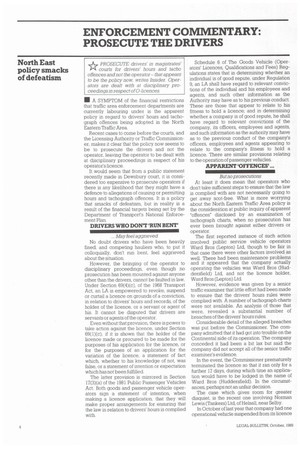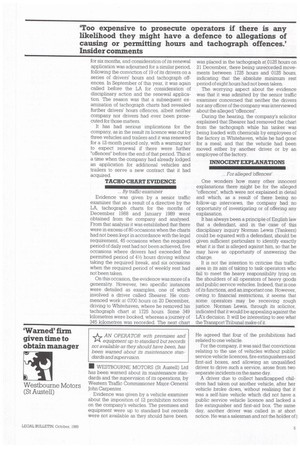ENFORCEMENT COMMENTARY: PROSECUTE THE DRIVERS
Page 152

Page 153

If you've noticed an error in this article please click here to report it so we can fix it.
*PROSECUTE drivers' in magistrates' courts for drivers hours and tacho offences and not the operatorthat appears to be the policy now, writes Insider. Operators are dealt with at disciplinary proceedings in respect of 0-hcences
111 A SYMPTOM of the financial restrictions that traffic area enforcement departments are currently labouring under is the apparent policy in regard to drivers' hours and tachograph offences being adopted in the North Eastern Traffic Area.
Recent rases to come before the courts, and the Licensing Authority or Traffic Commissioner, makes it clear that the policy now seems to be to prosecute the drivers and not the operator, leaving the operator to be dealt with at disciplinary proceedings in respect of his operator's licence.
It would seem that from a public statement recently made in Dewsbury court, it is considered too expensive to prosecute operators if there is any likelihood that they might have a defence to allegations of causing or permitting hours and tachograph offences. It is a policy that smacks of defeatism, but in reality is a result of the financial targets being set by the Department of Transport's National Enforcement Plan.
DRIVERS WHO DON'T 'RUN BENT'
... May feel aggrieved No doubt drivers who have been heavily fined, and competing hauliers who, to put it colloquially, don't run bent, feel aggrieved about the situation.
However, the bringing of the operator to disciplinary proceedings, even though no prosecution has been mounted against anyone other than the drivers, cannot be faulted in law. Under Section 69(4)(c), of the 1968 Transport Act, an LA is empowered to revoke, suspend or curtail a licence on grounds of a conviction, in relation to drivers' hours and records, of the holder of the licence, or a servant or agent of his It cannot be disputed that drivers are servants or agents of the operator.
Even without that provision, there is power to take action against the licence, under Section 69( I)(c), if it is shown that the holder of the licence made or procured to be made for the purposes of his application for the licence, or for the purposes of an application for the variation of the Licence, a statement of fact which, whether to his knowledge of not, was false, or a statement of intention or expectation which has not been fulfilled.
The latter provision is mirrored in Section 17(3)(a) of the 1981 Public Passenger Vehicles Act. Both goods and passenger vehicle operators sign a statement of intention, when making a licence application, that they will make proper arrangements for ensuring that the law in relation to drivers' hours is complied with.
Schedule 6 of The Goods Vehicle (Operators' Licences, Qualifications and Fees) Regulations states that in determining whether an individual is of good repute, under Regulation 9, an LA shall have regard to relevant convictions of the individual and his employees and agents, and such other information as the Authority may have as to his previous conduct. These are those that appear to relate to his fitness to hold a licence; and in determining whether a company is of good repute, he shall have regard to relevant convictions of the company, its officers, employees and agents, and such information as the authority may have as to the previous conduct of the company's officers, employees and agents appearing to relate to the company's fitness to hold a licence. There are similar provisions relating to the operation of passenger vehicles.
APPARENT 'OFFENCES' ...
But no prosecutions At least it does mean that operators who don't take sufficient steps to ensure that the law is complied with are not necessarily going to gel away scot-free. What is more worrying about the North Eastern Traffic Area policy is the consideration at public inquiry of apparent "offences" disclosed by an examination of tachograph charts, when no prosecution has ever been brought against either drivers or operator.
The first reported instance of such action involved public service vehicle operators Ward Bros (Lepton) Ltd, though to be fair in that case there were other factors involved as well. There had been maintenance problems and it appeared that the company actually operating the vehicles was Ward Bros (Huddersfield) Ltd, and not the licence holder, Ward Bros (Lepton) Ltd.
However, evidence was given by a senior traffic examiner that little effort had been made to ensure that the drivers' hours rules were complied with. A number of tachograph charts were not available. An analysis of those that were, revealed a substantial number of breaches of the drivers' hours rules.
Considerable detail of the alleged breaches was put before the Commissioner. The company admitted that it had got into trouble on the Continental side of its operation. The company conceded it had been a bit lax but said the company did not accept all of the senior traffic examiners evidence.
In the event, the Commissioner prematurely terminated the licence so that it ran only for a further 17 days, during which time an application would have to be lodged in the name of Ward Bros (Huddersfield). In the circumstances, perhaps not an unfair decision.
The case which gives room for greater disquiet, is the recent one involving Norman Lewis (Tankers) Ltd, of Helsall, near Selby.
In October of last year that company had one operational vehicle suspended from its licence for six months, and consideration of its renewal application was adjourned for a similar period, following the conviction of 19 of its drivers on a series of drivers hours and tachograph offences. In September of this year, it was again called before the LA for consideration of disciplinary action and the renewal application. The reason was that a subsequent examination of tachograph charts had revealed further drivers' hours offences, albeit neither company nor drivers had ever been prosecuted for those matters.
It has had serious implications for the company, as in the result its licence was cut by three vehicles and trailers and it was renewed for a 12-month period only, with a warning not to expect renewal if there were further "offences" before the end of that period. This at a time when the company had already lodged an application for additional vehicles and trailers to serve a new contract that it had acquired
TACHO CHART EVIDENCE ... By traffic examiner Evidence was given by a senior traffic examiner that as a result of a directive by the LA, tachograph charts for the months of December 1988 and January 1989 were obtained from the company and analysed. From that analysis it was established that there were in excess of 80 occasions when the charts had not been kept in accordance with the legal requirement, 45 occasions when the required period of daily rest had not been achieved, five occasions where drivers had exceeded the permitted period of 41/2 hours driving without taking the required break, and six occasions when the required period of weekly rest had not been taken.
On this occasion, the evidence was more of a generality. However, two specific instances were detailed as examples, one of which involved a driver called Shearer. He commenced work at 0700 hours on 20 December, driving to Whitehaven, where he removed his tachograph chart at 1725 hours. Some 349 kilometres were booked, whereas a journey of 345 kilometres was recorded. The next chart was placed in the tachograph at 0125 hours on 21 December, there being unrecorded movements between 1725 hours and 0125 hours. indicating that the absolute minimum rest period of eight hours had not been taken.
The worrying aspect about the evidence was that it was admitted by the senior traffic examiner concerned that neither the drivers nor any officer of the company was interviewed about the alleged "offences".
During the hearing, the company's solicitor explained that Shearer had removed the chart from the tachograph while his tanker was being loaded with chemicals by employees of the factory in Whitehaven, while he had gone for a meal; and that the vehicle had been moved either by another driver or by an employee of the factory.
INNOCENT EXPLANATIONS For alleged 'offences' One wonders how many other innocent explanations there might be for the alleged "offences", which were not explained in detail and which, as a result of there being no follow-up interviews, the company had no opportunity of investigating or of offering any explanation It has always been a principle of English law that a defendant, and in the case of this disciplinary inquiry Norman Lewis (Tankers) could be equated with a defendant, should be given sufficient particulars to identify exactly what it is that is alleged against him, so that he may have an opportunity of answering the charge.
It is not the intention to criticise this traffic area in its aim of taking to task operators who fail to meet the heavy responsibility lying on the shoulders of all operators of heavy goods and public service vehicles. Indeed, that is one of its functions, and an important one. However, owing to financial restrictions, it seems that some operators may be receiving rough justice, Norman Lewis, through its solicitor, indicated that it would be appealing against the LA's decision. It will be interesting to see what the Transport Tribunal make of it.




























































































































































